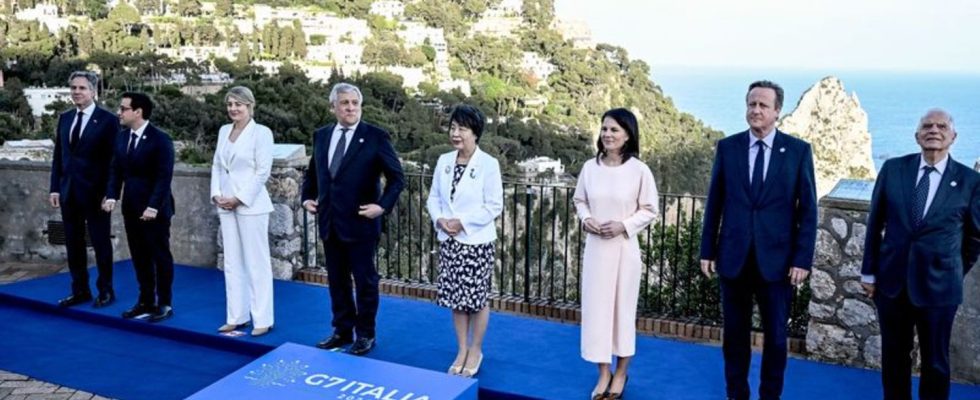Conflicts
G7 foreign ministers talk about China
What will be said in the G7’s final declaration on the wars in Ukraine and the Middle East is eagerly awaited. photo
© Britta Pedersen/dpa
Last day of the G7 foreign ministers meeting in Capri. Finally, it’s about cyber security and China. But what is said about the wars in Ukraine and the Middle East is probably more important.
Foreign Minister Annalena Baerbock (Greens) said on ZDF’s “heute journal” that in view of the devastating Russian air strikes on Ukraine, more Western military aid is needed. “Around the world we need to scrape together the air defenses we have.” She vigorously rejected criticism that the EU was hesitant to provide military support. “We’re not waiting for anything. We just can’t do witchcraft and magic,” she said.
Scholz is promoting the delivery of anti-aircraft systems
At the end of the EU summit in Brussels, Chancellor Scholz said that he had asked for further deliveries of anti-aircraft systems there. According to him, Ukraine has specifically asked for seven additional Patriot systems. Now that Germany has promised one, it is to be hoped that six more will be found in other NATO states.
Baerbock said about Iran’s major attack on Israel with hundreds of rockets and drones almost a week ago that the federal government, together with the EU, had significantly tightened the tone towards Tehran and had now “launched countless sanctions regimes”. Baerbock rejected the accusation that sanctions were virtually useless and showed helplessness.
Rather, they showed countries like Iran and Russia that brutal breaks with the peaceful world order would not be tolerated. The reason for the Iranian attack was an air strike on the Iranian embassy compound in Syria at the beginning of April, for which Israel is presumably responsible.
Relationship with China
With a view to China’s increasingly aggressive behavior in the Indian Ocean and the Pacific region, Baerbock had already stated at the start of the meeting that this was felt not only by the G7’s Pacific neighbors such as the USA, Canada and Japan, but also by Europe. The authoritarian People’s Republic has been gaining international importance in both the economic and political fields for several years.
At the invitation of the current chairman Italy, the heads of state and government of the Group of Seven will meet in mid-June in the south of the country for their annual summit. The foreign ministers will then meet again in November. The group includes the USA, Canada, Great Britain, Japan, France, Italy and Germany.
Zelenskyj via video at the NATO-Ukraine Council
Today the NATO-Ukraine Council is meeting at the headquarters of the Western military alliance in Brussels to discuss the current situation. Ukrainian President Volodymyr Zelenskyj joins us via video from his homeland.
Discussions in Capri were dominated by concerns about a threat of escalation in the Middle East following last weekend’s Iranian attack on Israel. Italy, as host, assured Israel of support on behalf of all G7 states. At the same time, Foreign Minister Antonio Tajani urged both sides to de-escalate.
Concern about wildfires in the Middle East
It is feared that a major Israeli counterattack in the region could lead to a conflagration – far beyond the Gaza war that has been going on for six months. It is therefore eagerly awaited to see how far the G7 ministers go in the final declaration with criticism of Tehran and the announcement of additional sanctions for Iran. The background is also considerations as to how Israeli Prime Minister Benjamin Netanyahu can be prevented from launching a massive counterattack.
The USA and Great Britain have now introduced new punitive measures against Tehran. The EU will probably follow suit next week.
More air defense systems for Ukraine?
The second dominant topic was the Russian war of aggression against neighboring Ukraine, which has been going on for two years. Baerbock called on the G7 partners to provide Kiev with additional air defense systems. Germany is currently preparing to deliver a third Patriot system. NATO Secretary General Jens Stoltenberg, who was an official guest for the first time, also called for additional defense systems to be delivered.
As a guest on Capri, Ukrainian Foreign Minister Dmytro Kuleba once again urgently asked for help. All supporters should maximize their efforts “to give Ukraine what it needs to continue to effectively defend itself against this Russian aggression.” Kuleba appealed to the US Parliament to quickly pass the planned aid package worth the equivalent of around 57 billion euros.

